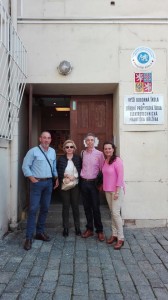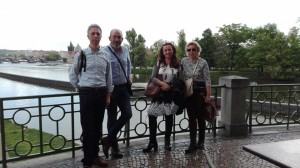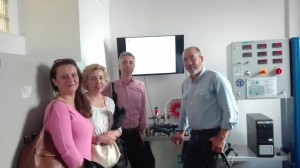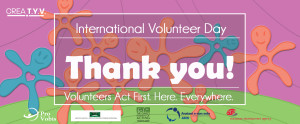A lot has been already said about CREA.T.Y.V. project. This time we would like to share that on Moday 23rd April EUDA successfully finished the last intergenerational workshop. The Gaiety School of Acting in Dublin prepared a perfect manual which we followed during the four workshops. Thanks to well-structured instructions the participants experienced an entertaining and quite motivating workshops. The responses were positive with special emphasis on interactivity. We were happy to see that a lot of participants made new friends and that they established new friendships despite age differences.
At the beginning of February EUDA team composed of 3 mentors attended event “Train of Trainers” in Dublin. Cold but sunny weather in their free time didn´t stop them from sightseeing Dublin beauty such as Half Penny Bridge or legendary Temple Bar. Training lasted throughout the whole week and attenders from partner countries learned how to host and lead workshops. New experiences gained this week will be put in practice during pilot workshop in the Czech Republic.
There will be 4 workshops – motivational, inspirational, intergenerational and evaluating. Motivational workshop will be open for people in the age of 18-25, who face all sorts of life issues. Inspirational workshop will be only for volunteers among elderly citizens, who are enthusiastic and courageous enough to support youth in becoming independent. At the same time, elderly will encourage youngsters into volunteering and explain them that even a small step can change their lives. Afterwards intergenerational workshop will take place and both groups will meet each other and work on given tasks by EUDA mentors. The last but not the least evaluating workshop will happen. Participants interested in volunteering will be introduced to organizations working with volunteers and time for their feedback will be also included.
The 5th of December is a very special day for Czech childern and their parents. Every Czech household is visited by St. Nicholas with his companions, angel and devil, who reward the well-behaved kids and punish the mis-behaved ones.
However, there is something more about this day apart from the Czech custom. The 5th of December is the world’s International Volunteer Day and we would like to thank to all these people who devote their leisure time to volunteer duties. These people work for free to serve our society and to make the world a better place to live. Their volunteering activites may vary greatly, yet there is one common thing for them all – they ask nothing in exchange for their work and time.
EUDA participates in an Erasmus + project on volunteering and we know what it takes to be a volunteer. Therefore, we would like to thank you all and wish you a happy Volunteer Day!
Please read more about CREA.T.Y.V.
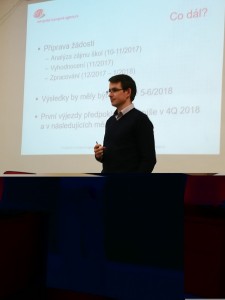
On Wednesday, November 15th the EUDA team was glad to host the representatives of Easy School of Languages from Valletta, Malta. The seminar took place at Střední průmyslová škola in Prague, and welcomed some seventy-five enthusiastic teachers as participants.
After a brief introductory video showing the beauties of Malta and the advantages the Easy School of Languages provides, the representatives of the School, Ms. Galeann Barbara and Ms. Rita Ramelyte went on to describe the main features of their Institute, such as the pretty location, the comfortable accommodation options and, of course, the different types of English courses the School offers.
Among them, the most popular and the main topic of the seminar, was the Teacher Training course: the School works with teachers from various countries and different backgrounds to help them improve their language skills and the quality of English language teaching.
The presentation was very much appreciated by the participants, and the seminar continued with Mr. Martin Synkule explaining what EUDA can do for those interested in taking one of the courses presented, and how this fits in the framework of EUDA’s work within the Erasmus+ Program.
Finally, the Q&A session led to an enthusiastic debate among the participating teachers, who were able to further understand the structure of the courses, the functioning of Erasmus+ and the advantages that the Easy School of Languages and EUDA can provide.
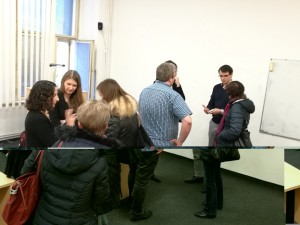
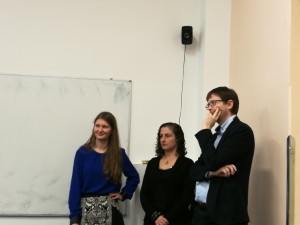
During the days of Thursday and Friday, November 9-10th 2017, the EUDA team took part in the second Partners’ Meeting for CREA.T.Y.V. – Creative Drama for Training Young Volunteers in Intergenerational Learning Environments, in Prague, Czech Republic.
The project, and the partners involved from Romania, Italy, Ireland and the Czech Republic, aims at fostering inclusive education of young people who live on the edge of the society.
After a brief catching-up session, followed by a welcoming introduction, the partners were able to evaluate their own work and progress thanks to the review of an internal evaluation questionnaire, and to further discuss possible improvements.
The main features of the project were discussed, such as the drafting of the E-Book that will ultimately describe an education program that will provide new learning opportunities in volunteering in an intergenerational mentoring approach through creative drama.
Later, the representatives of The Gaiety School of Acting presented the structure of the planned Workshops and introduced the pilot project.
After a quick lunch the partners went back to discuss the main details of CREA.T.Y.V., such as communication strategy, timetable and selection procedures.
Finally, the partners discussed the future planned mobilities and how to approach them.
Last but not least, all the partners decided to go for a walk to explore the beauties of Prague, and finalized the meeting with an authentic Czech dinner.
During the third week of September the EUDA App Your School team took part in the second Learning Teaching Trainig Activity. The LTTA took place in Bologna, Italy. Teams from all eight participating countries gathered to present their Digital Atelier proposals, including some of the practical excercises. Further presentations and discussion concerned the Best practices in each of the countries. Participants were encouraged to share their national experiences and expertise which served as an inspiration for other partners. LTTA was organized and hosted by Zaffaria Centro A. Manzi. To read more about App Your School please see here.
VINA-Validating Informal and Non-Formal Acquired skills represents a partnership between 5 organizations from 5 EU member countries (Italy, Czech Republic, Greece, Poland and the United Kingdom) and it aims at promoting non-formal and informal education, as well as specific tools, in addition to growing awareness regarding recognizing the importance of informal and non-formal learning.
The project will provide information regarding how to access adult learning services. This purpose will be achieved by realizing a database that will evaluate and describe tools regarding informal and non-formal education. Also, the project will address the issue regarding the quality of the information.
Furthermore, VINA project wants to tackle and solve the following aspect: nowadays, an adult who is eager to validate the competences that he has acquired through non-formal and informal education encounters a range of problems because of the lack of access to appropriate tools. In other words, these tools exist, but they suffer from lack of possibility of implementation. With the aid of the VINA project, useful recommendations will be provided for users. Each partner organization from the 5 different countries will have a set of tasks and responsibilities to be achieved.
The target group of the project is represented by educators, lecturers and other users who need to update their skills in the field of informal and non-formal education, in order to meet the requirements for optimally working in the 21st century.
At the kick-off meeting in Italy, the 5 partners discussed the VINA project in details, including actions on budget, dissemination, Database instrument and the ROTA validation analyser.
Main tasks and responsibilities of our company, European Development Agency, are:
- Coordinate internal and external evaluation of the project;
- Attend the foreseen transnational meetings (two people for each meeting);
- Support partners in the implementation of all the foreseen activities;
- Organise 1 multiplier event in Czech Republic.
It is our pleasure to announce that on the 29th May, the second national training for teachers involved in the App Your School project took part at ZUŠ Music Art in Prague. The main purpose of the training was to share more practical information about the project and the related activities. The participants received valuable information directly from the teachers who took part in the Bologna training in January 2017. They shared their experience, described the activities they had attended in Bologna and explained what they have learned there.
As part of the training, all 18 participants had the opportunity to try some tasks, specifically the so-called Tree. That means the participants were supposed to create a multiple portrayal of a tree with the use of different materials and techniques, for instance paper, wire or digital animation. At the end of the training, a discussion about the current state of art took place as the teachers from Arts School Music Art explained their lectures where they use ICT tools and support children’s creative thinking. Finally, the teachers had a brainstorming about the possible future Digital Atelier activities conducted within the project.
On 22th May, European development agency in collaboration with ZUŠ Music Art and DISK Multimedia company organized a National Training fo App Your School. The project concerns the use of media and technology in education, more info here. Within the framework of the conference, participants learned interesting information about the project App Your School, which explores new media and applications. EUDA Manager also presented biographies of two Italian teachers Manzi and Munari who are considered to be among the first significant innovators in the field of using ICT in education. Therefore, they are role models for the project.
In the second part of the conference, the representatives from the ZUŠ presented the current state of art of multimedia education in the Czech Republic. Furhther, they spoke about their personal experiences with the use of multimedia in classes. The conference was attended by around thirty listeners who had the opportunity to learn more about the importance and effectiveness of using new media and technologies and thus took a number of valuable insights that they could certainly use in the future.
Staff mobility-Job shadowing of 4 Spanish employees took place in Prague from 14th to 19th May, 2017, under the auspices of the European Development Agency s.r.o. (EDUA). During the mobility they had the opportunity to learn about the style of teaching in Czech schools and the functioning of the city council. Mobility was carried out under the ALJARAFE EN EUROPA project. Its main goal was to familiarize teachers Delores and Manuel (teaching in Spanish vocational schools) with the use of ICT tools and other interactive tools at Czech schools. Beside this, for Mercedes and Antonio, from Mancomunidad Aljarafe, was important to understand the principle and functioning of the Czech city authorities and the city council. During their stay, not only they acquired a lot of interesting information from their Job shadowing, but also had the opportunity to see the most important places in Prague.
Upon arrival, the participants met with EDUA employees for a welcoming meeting that was followed by a tour of Prague City Hall. The next day in the morning, job shadowing took place at Secondary Technical School of František Křižík where the participants had the opportunity to observe classes of turbines, automation and IT. After lunch there was a tour of the historical center of Prague. Wednesday morning was dedicated to job shadowing at Prague 7 City District, followed by a tour of the Prague 7 district-Stromovka, Letná and Holešovice. On Thursday, job shadowing took place at Primary school K Dolům, where participants got familiar with a magic box ICT tool that is popuar among younger pupils. On Friday, before the departure, the participants were able to manage job shadowing at Fire Rescue Service of the Czech Republic and at Prague Institute of Planning and Development.
Within this five-day mobility, Spanish employees have become aware of the functioning of Czech schools and the use of interactive tools during lessons as well as the functioning of the city authorities. Due to the very positive attitude of Czech schools and city districts, Spanish staff have taken a number of valuable insights and mobility is considered to be very successful.
